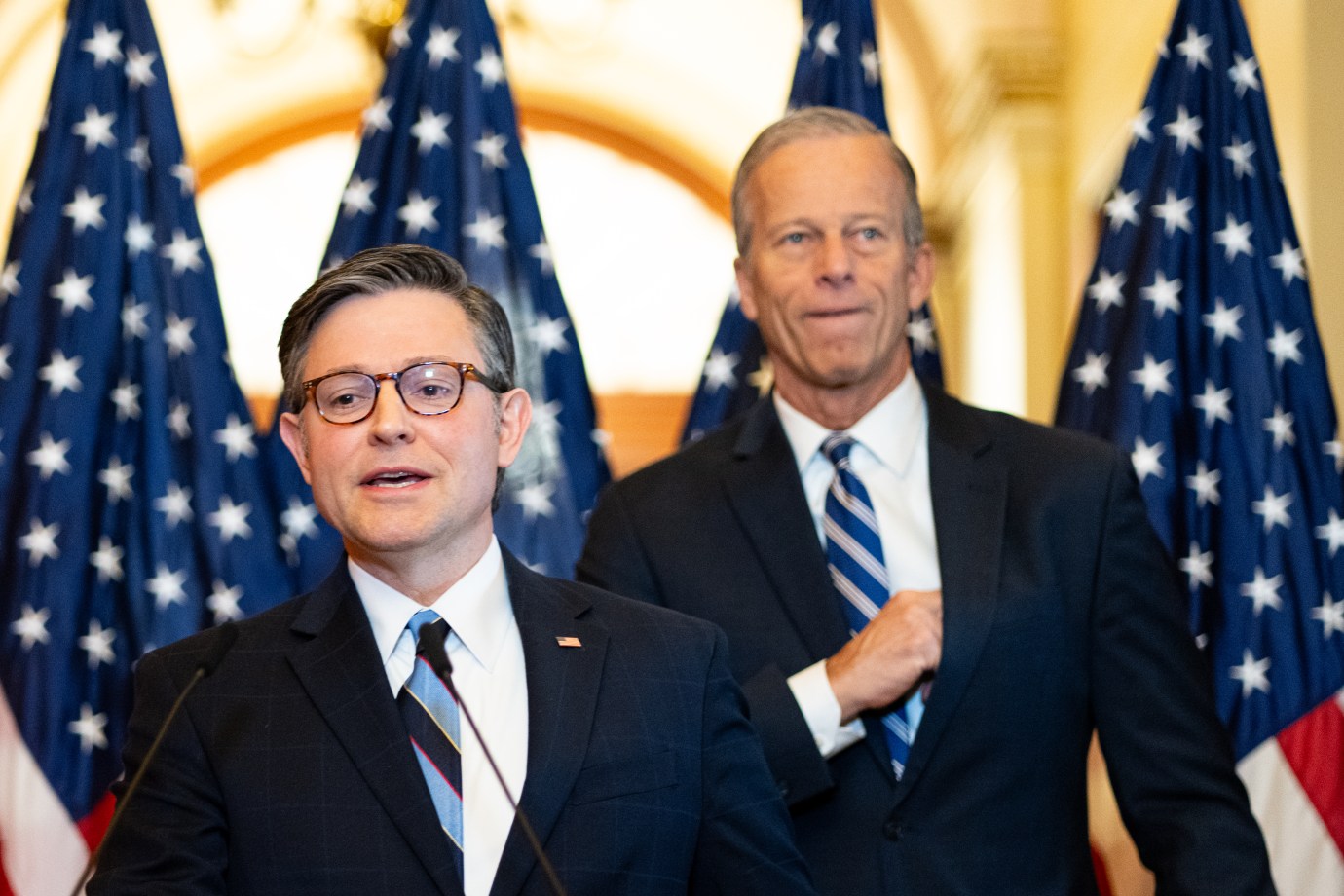Happy Tuesday! Congratulations to Tom Kopke, who for the second straight year won the Gloucestershire cheese-rolling competition in England. “I risked my life for this,” he said after winning the contest in which people chase a wheel of cheese down a steep hill. “It’s my cheese—back to back.”
Quick Hits: Today’s Top Stories
- Russia hit Ukrainian cities and towns in a massive drone and missile attack for the third straight day early Monday morning, killing at least 30 civilians and injuring more than 163 others, per Ukrainian authorities. According to Ukrainian President Volodymyr Zelensky, Russian forces unleashed 355 drones—the largest number deployed in a single assault since the war’s outbreak—and nine cruise missiles against Ukraine. On Sunday night, President Donald Trump criticized Russian President Vladimir Putin’s aerial attacks, saying he “has gone ABSOLUTELY CRAZY.” In response, Kremlin spokesman Dmitry Peskov said on Monday that Russia was “grateful” for Trump’s work in organizing negotiations but added that the current situation can lead to “emotional overload of everyone absolutely and with emotional reactions.”
- Trump also levied new threats against Harvard University on Monday morning, sharing on social media that he was considering taking away $3 billion in grant funding from the university and dispersing it among trade schools. In a separate post Monday morning, Trump criticized Harvard for not sharing information about its foreign students, which he said is necessary to help his administration determine “how many radicalized lunatics, troublemakers all, should not be let back into our Country.” While the White House on Thursday barred Harvard from enrolling international students—citing the university’s refusal to hand over information of its foreign students—the university quickly sued the administration, and on Friday a federal judge temporarily blocked the move until the merits of the case could be heard.
- In response to a Financial Times article this weekend reporting that U.K. officials are investigating possible Russian involvement in the recent arson attacks on U.K. Prime Minister Keir Starmer’s personal home and other property he formerly owned—per unnamed British senior officials—Kremlin spokesman Dmitry Peskov denied any Russian culpability. “All these suspicions are groundless, unsubstantiated and often laughable,” he said. British prosecutors have charged three men, two Ukrainian nationals and one Romanian citizen, in connection with the arson attacks.
- News outlets reported Monday that Israel rejected a ceasefire proposal from Hamas because it would secure neither the full release of all hostages held by the terror group nor end the war. Hamas officials said Monday that their proposal was presented to them by the U.S., a claim that Trump’s special envoy to the Middle East, Steve Witkoff, later refuted. The U.S. has proposed a different deal that would exchange 10 living Israeli hostages and 19 deceased hostages for a ceasefire ranging from 45 to 60 days and the release of certain Palestinian prisoners, which Witkoff said Israel has accepted. “That deal is on the table,” Witkoff said Monday. “Hamas should take it.”
- Homeland Security Secretary Kristi Noem on Sunday spoke with Israeli Prime Minister Benjamin Netanyahu about ongoing U.S. negotiations with Iran over its nuclear program, later telling Fox News it was “a very candid conversation.” Meanwhile, a statement from Netanyahu’s office said that Noem offered “unwavering support” for Israel, and praised Netanyahu for “his conduct of the war” in Gaza and for establishing a fence along the Israeli-Egyptian border. On Monday, Noem attended a ceremony commemorating the lives of Yaron Lischinsky and Sarah Milgrim, the two Israeli embassy officials killed by a pro-Palestinian American gunman in Washington, D.C., last week.
- Trump said he will issue a “FULL and Unconditional Pardon” to Scott Jenkins, a former sheriff of Culpeper County, Virginia, who was sentenced to 10 years in federal prison following a December 2024 conviction on charges including conspiracy, honest services fraud, and bribery involving federally funded programs. The president, announcing the decision on social media, said Jenkins had been “dragged through HELL by a Corrupt and Weaponized Biden DOJ.”
- Charles Rangel, a former longtime Democratic congressman from New York and a decorated Korean War veteran, died Monday at age 94. Rangel was awarded a Purple Heart and Bronze Star for valor for leading 43 U.S. soldiers to safety by crossing over a mountain while injured at the Battle of Kunu-ri. He was elected to the House of Representatives in 1971, where he served until retiring in 2017. Between 2007 and 2010, Rangel chaired the House Ways and Means Committee—the first black congressional member to hold the position—but had to step down after the House voted to censure him in 2010 for 11 ethics violations.
Johnson Earns Major Victory With Megabill’s Passage

To House Speaker Mike Johnson, wrangling opposing Republican factions to support “one big, beautiful” reconciliation megabill that includes President Donald Trump’s legislative agenda was more than a high-wire act—it was, in his own words, like “crossing over the Grand Canyon on a piece of dental floss.”
But on Thursday, Johnson made it farther than many expected. The sprawling bill—more than 1,000 pages long—passed the House by just one vote, 215-214, ahead of Johnson’s self-imposed Memorial Day deadline. A handful of last-minute changes won over enough Republican holdouts to put the bill over the top.
Still, getting the package out of the House is only half the journey. It now heads to the Senate, where a new round of intraparty bargaining begins and Majority Leader John Thune faces his own tightrope walk. He has only three votes to spare, and some Senate Republicans are already hinting at opposing the package without significant changes. The most difficult part of getting the reconciliation bill across the finish line might still be ahead.
But the bill’s passage in the House still marks a major victory, especially since Johnson overcame the biggest hurdle in front of the bill—reconciling the opposing priorities of the GOP factions. As we wrote before the bill was passed:
Two main issues are at play. Spending hawks want to ensure deep spending reductions, but more moderate members want to ensure those cuts did not severely affect Medicaid coverage. Meanwhile, Republicans from New York, New Jersey, and California want to raise the cap on the state and local tax (SALT) deduction, but that’s not much of a priority for GOP House members generally—plus, a higher SALT cap would jeopardize other parts of the legislation.
In the end, Johnson provided a slew of concessions to hardliners. Late Wednesday night, Johnson released a new version of the bill that moved the enforcement of new Medicaid work requirements from 2029 to December 2026, ended certain clean-energy tax credits in 2028 instead of three years later, and increased the SALT deduction cap from $30,000 to $40,000 for people making less than $500,000 a year. Whether those provisions will survive in the Senate remains to be seen.
“The bill is a hodgepodge based on the different elements of the Republican conference in the House, all of whom had to be brought along in support of this bill if they were going to get it through the chamber,” Philip Wallach, senior fellow at the American Enterprise Institute, told TMD. “They kind of had to take the Oprah approach of ‘everybody gets their prize.’”
But that strategy can only do so much when different groups, like moderate Republicans and deficit hawks, had different priorities. The final bill didn’t reduce spending as dramatically as some would have liked. “Fiscally, this bill makes the deficits worse. There’s really no getting around that,” Wallach said.
The Congressional Budget Office estimates that the bill will increase the deficit by an eye-popping $3.8 trillion from 2026 to 2034. While Johnson insists that the estimates are “dramatically overstated,” claiming that the legislation will boost the economy, Wallach explained that economic growth will only mitigate the hit to the deficit, not eliminate it. The debt hike already has upset fiscal hawks in the Senate.
“I do think that should lead us to be pretty skeptical of the amount of leverage that the Freedom Caucus people have,” Wallach said of the House caucus that pushed for deeper spending cuts. “Ultimately, they come from extremely Trump-loving districts, most of them, and Trump has made it clear that he really will try to primary people who oppose him from the right.”
The bill’s passage is a significant win for Trump. The legislation preserves his 2017 tax cuts, exempts tips and overtime from taxes until 2028, provides more than $50 billion in border security funding, raises the debt ceiling, and includes other Trump administration priorities—all in one package. It also restricts Medicaid funding for Planned Parenthood, creates savings accounts of $1,000 for children born from 2024 through 2028, and implements restrictions on who qualifies for food stamps. Republicans are using the reconciliation process to bypass the Senate filibuster so that passage requires only a simple majority vote.
“It’s the ‘one, big, beautiful bill.’ The key word is ‘one.’ [Congressional Republicans] really have put all their eggs in one basket,” Wallach said. “That was a strategic choice that’s meant to make it so that nobody really feels like they can be against the president, because how can you be against his one big legislative bill? And that was a good enough strategy to get through the House.”
Trump was also a key force in helping Johnson get the bill over the top. Days before the vote, the president visited the Capitol to win over remaining Republicans holdouts, and he seemed to help keep detractors like the Freedom Caucus from tanking the legislation. Trump warned House Republicans not to “f—k around” with Medicaid in a stark repudiation of fiscal hawks who wanted more spending cuts, but most of the House Freedom Caucus eventually threw their support behind the legislation.
Caucus chair Rep. Andy Harris of Maryland, for example, chose not to vote against the bill—instead voting present—not long after he told reporters that the White House promised executive orders that will curb “fraud, waste and abuse of Medicaid.” Harris called the promise “significant.”
Before the bill passed, when reporters asked Freedom Caucus member Rep. Ralph Norman of South Carolina whether Trump changed his vote, Norman replied, “He did a great job. He really did. What a salesman.” By the end, the only two “no” votes were Rep. Thomas Massie of Kentucky and Rep. Warren Davidson of Ohio. Massie has opposed the president on several occasions over the years and voted against the bill because of deficit concerns. Davidson’s “no” vote was more surprising—he also cited deficit increases, saying promises that “other people” will cut spending wasn’t enough to sway his vote.
Whether Trump can convince Senate skeptics to support the bill, on the other hand, remains to be seen. Johnson openly encouraged Senate Republicans on Sunday to make “as few changes as possible,” especially since any changes must be ratified in the House. But Sunday night, the president seemed to give the Senate some leeway to make adjustments.
“I want the Senate and the senators to make the changes they want. It will go back to the House and we’ll see if we can get them. In some cases, those changes may be something I’d agree with, to be honest,” Trump said. “ I think they are going to have changes. Some will be minor, some will be fairly significant.”
Wisconsin Sen. Ron Johnson, a fiscal hawk, has insisted that he wants to bring the federal government back to pre-pandemic spending levels. Johnson declared that he will not vote for the bill with just “minor tweaks,” saying that he already has enough votes to “stop the process.” Kentucky Sen. Rand Paul expressed similar concerns, saying that he didn’t think the bill was a “serious proposal” because of its increases to the national debt. Thune said he recognized the “unique moment in time” in which Republicans could start to control government spending.
Meanwhile, Missouri Sen. Josh Hawley indicated that he would not support Medicaid cuts, and moderates like Sen. Lisa Murkowski of Alaska and Sen. Susan Collins of Maine also have concerns about cuts to health care. Other elements in the bill added by House Republicans, like higher SALT deduction caps, aren’t priorities for their Senate counterparts at all, given that high-tax states like New York, New Jersey, and California—whose GOP representatives support the higher caps—do not have any Republican senators. “The things that get it through the Senate might make it very hard to get it back through the House,” Wallach said. There may not be an easy fix to convince all sides to compromise.
“It’s a different dynamic in the Senate. I don’t anticipate the president just showing up at the end and being able to put everybody in line in quite the same way,” Wallach said. “There’s a few people who have made it clear that they are comfortable voting against the president on a routine basis in the Senate.”
Time is not on the GOP’s side. Because congressional Republicans included the increase to the debt limit in the megabill, it now has to be passed by the before the government hits the debt ceiling. That gives Congress until roughly August to pass the reconciliation bill—and Johnson and Thune want the bill to be ready for Trump to sign by July 4.
However, there is still the chance that the bill’s markup in the Senate goes more smoothly than expected. Murkowski expressed reservations about making drastic changes, and Hawley said he wants to pass a bill the House can accept to avoid a protracted back-and-forth between the House and Senate. Leaders in both chambers have been discussing the legislation for weeks, increasing the chance that something similar to the House bill passes in the Senate.
Because all of Trump’s legislative priorities are in one bill, the holdouts have an incentive to capitulate. “It’s still hard to be amongst the four senators who, in the end, decide to derail this legislative effort,” Wallach said. “So there’s a lot of pressure to get to ‘yes.’”
Today’s Must-Read

Scientists Need to Explain Themselves
Crises can be useful for pressure-testing systems and exposing their weaknesses. Such is the case with the delays and outright cancellations of federal funds for worthy biomedical science research projects. DOGE-engineered interruptions of research programs funded by the National Institutes of Health (NIH) and National Science Foundation (NSF)—with only muted objections by politicians and the public—reveal a systemic brittleness in the public’s support for science. It is possible that the public’s unwillingness to rise up in defense of science owes much to its having lost faith in scientists. … My fellow scientists would probably like to believe that our sinking poll numbers reflect the public’s distaste for marauding students and censorious humanities colleagues. But we must admit that we share some of the blame. We do not put enough effort into explaining our work to the members of the public, who are our patrons.
Toeing the Company Line
Worth Your Time
- In the Washington Post, George Will writes, “On this Memorial Day, take a moment for Ernie Pyle’s ‘The Death of Captain Waskow.’ “[Pyle] was a middle-aged Middle American travel writer until Hitler tried bringing Britain to its knees by bombing. The Blitz brought the war, as reported by Edward R. Murrow of CBS radio, to the United States, and brought Pyle to the European theater of a war he would not survive. War, as reported by him from what he called the ‘worm’s eye view,’ was war as the common soldiers experienced it: discomfort, weariness, mud, filthiness, loneliness and stretches of boredom punctuated by episodes of death. Death somehow simultaneously random and routine. David Chrisinger, in his 2023 book ‘The Soldier’s Truth: Ernie Pyle and the Story of World War II,’ tells the story of the man who wrote this.” Pyle’s work immortalized one war veteran in particular: “Henry T. Waskow, writes [David] Chrisinger, worked his way up from the lowest enlisted ranks to captain, an extraordinarily beloved officer but also an ‘ordinary man.’ Moments before his death he had a craving for toast.” Thousands of Americans still seek Waskow’s grave at the Sicily-Rome American Cemetery in Italy, but he’s not the only war hero buried there. “Referring to all those in the cemetery, [a guide] said: ‘Most of these boys have never had a visitor.’” Will writes, “Visit them in your mind this Memorial Day.”
- In Law and Liberty, Aidan Grogan observes that nostalgia for the good ol’ days is nothing new. “In his 1804 poem ‘Jerusalem,’ Romantic poet William Blake lamented the ‘dark Satanic Mills’ of the Industrial Revolution blotting out the green pastures and natural beauty of England. Blake’s critique of industrialization and its economic and social disruptions reflected the growing pains of a society in transition—from an economic order of rural, impoverished subsistence to one of urban, technological affluence,” Grogan wrote. “Two centuries later, a new transition is underway as developed economies shift from manufacturing to services. But among economic populists, a new Blakean nostalgia has manifested for the days of yore, except this generation of romantics dreams of a return to the ‘dark Satanic mills’ that Blake despised.” Would returning to the mills lead to a better, revitalized life? “The dark, satanic mills were engines of economic progress, but wistful longing for manual labor in factories overlooks how these economic conditions undermined traditional social structures and uprooted men and women from an environment conducive to child-rearing. … The twenty-first century’s digital economy may ironically enable a true ‘return to tradition’ that conservatives, in particular, should welcome.”
Washington Post: EU Says It Will Fast-Track Tariff Talks With U.S. After Trump Threat
Paula Pinho, a spokeswoman for the European Commission, told reporters Monday that there was “new impetus” for the talks, which have been ongoing for weeks.
“They agreed both to fast-track the trade negotiations and to stay in close contact,” Pinho said. “It’s positive to see that there’s engagement also at the level of the presidents, and from our side, we always said that we were ready to make a deal.”
In the Zeitgeist
Pittsburgh Pirates slugger Oneil Cruz blasted a home run Sunday that left the bat going 122.9 miles per hour. That’s the hardest-hit ball since Major League Baseball’s Statcast analytics tool started keeping track in 2015.
Watch the moment Cruz powered the ball out of the stadium. (That streak of white from the bat, midswing, is indeed the ball.)
Let Us Know
What do you think will happen to the megabill in the Senate? Are senators right to be concerned about cuts to Medicaid and other provisions?



















